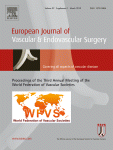Vascular Surgery today includes interventional procedures (open surgical and endovascular) in addition to risk factor reduction and medical treatment.
It is equally important for the vascular surgeon to train in clinical investigative methods, non-surgical treatment and decision making, as is training in technical aspects of interventions.
Similarly, it is vital that the vascular surgeon always recommends the treatment which is best to the individual patient, not only what he/she can do or what is best for other reasons, i.e. financial.
 This view is postulated by the President of the World Federation of Vascular Societies (WFVS), Dr Henrik Sillesen, in his speech published under the title World Federation of Vascular Societies: Presidential Address, in the “European Journal of Vascular and Endovascular Surgery”, [Suppl. 1] March 2010.
This view is postulated by the President of the World Federation of Vascular Societies (WFVS), Dr Henrik Sillesen, in his speech published under the title World Federation of Vascular Societies: Presidential Address, in the “European Journal of Vascular and Endovascular Surgery”, [Suppl. 1] March 2010.
The World Federation of Vascular Societies has representation from the Vascular Societies of Europe, Australia-New Zealand, North America, Brazil, South Africa, Japan, India, Asia and Middle East.
“…Therefore, training to become a good vascular surgeon includes training to become a good doctor. Treating vascular patients includes not only the technical aspects of the procedure, being it endovascular or open, but it is equally important to ensure that the treatment offered is the best for the individual patient, not just what the attending physician himself is able to perform or what is more attractive with respect to income.
Aggressive medical therapy has been shown to be very beneficial for our patients. Recently, preoperative risk factor reduction (smoking cessation especially) as well as preoperative medical treatment has been shown to reduce surgical morbidity and mortality. Thus, the issue of vascular surgeons needing to become vascular specialists is truly based on evidence showing a benefit to our patients. Rather than being surgeons waiting for other doctors to refer patients for surgery, we wish to be the experts that patients are referred to for evaluation of total treatment needed. I am sure that only few vascular surgeons wish to end in a situation as cardiac surgeons where cardiologists decide which patients the cardiac surgeons may operate.
Along the same lines, the ability of the vascular surgeon (specialist) to perform/evaluate simple and advanced vascular testing is extremely valuable. This means that we, during one consultation (i.e. the first), in many cases may evaluate and investigate the patient and suggest a treatment plan for the patient. Not many specialties are able to do that. Not only is this nice for the patient, but most certainly it also results in better quality of treatment…”






